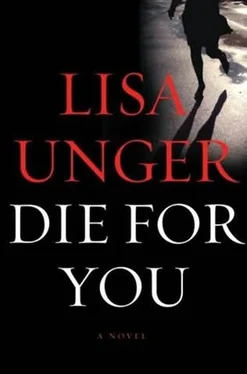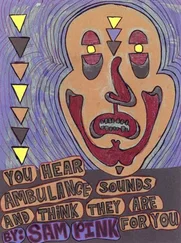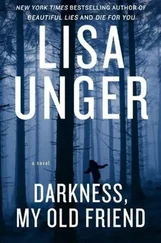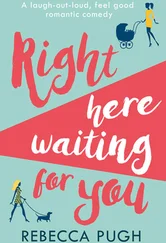Grady had never heard her say anything like that. He always thought of her as so sensible, pragmatic, not the type to worry about whether her kid had designer jeans or not.
“But he doesn’t need those things,” Grady said. “I never had them when I was a kid. Yeah, it sucked then. But I was better for it. And don’t they wear uniforms at private school?”
“Yeah, they do,” she said with a nod. “But after school and at parties, you know. Those kids are his friends. They live in homes that look like hotels. They show up in Polo and Izod. I hate sending him in less. But I have to. I won’t go into debt or sacrifice his future. And it’s almost Christmas. He wants a Wii, and a new bike. I can’t afford to get him all the things his friends will get.”
He could tell by the line of her mouth that she was sad, that these things worried her in bed at night. He wished good people didn’t have to fret over money.
“But I bet none of them has a mom who knows kung fu.”
“That’s true,” she said with a slow grin. “I am cool.”
“And cool beats rich any day. You could kick all the other moms’ asses.”
“Thanks, G.”
She looked down at her cuticles, snapping her right thumb and pinkie nail together. Something she did when she felt awkward or uncomfortable.
“I guess what I’m saying is that it’s not so hard to understand why Kristof Ragan liked what he had with Isabel Raine-the money, the lifestyle, the image. If it hadn’t been for Camilla Novak making threats, I doubt he would have fled. He’d still be running his company, maybe screwing around, but I think he liked the whole successful urban couple thing. He liked what he was with her.”
It made sense to Grady. Kristof Ragan had the life he wanted. Why would he leave it for Camilla Novak? He wouldn’t. He may have wanted her once; she was beautiful. But Isabel Connelly was the golden ticket-not just money. Class. Respect. With her, he had entrée into a whole other world.
“So who was the crew that trashed his office and home?” Jez said, flipping through the file, staring at the crime-scene photos. “How did he have associations like this?”
“Through his brother?”
Jez held up one of the frames Isabel Connelly had sent. Kristof Ragan surrounded by grim-faced, black-coated men on a Brooklyn pier. One of them his brother.
“I don’t think his brother’s allies were interested in working with him anymore, do you?”
“Maybe not,” he admitted.
Anyone else would be dead, but Kristof Ragan was still alive. He flipped through the photos, watching events unfold a frame at a time.
“He was combat-trained somewhere,” he said. “You don’t take down four armed men like that without some training.”
“The real question is: Who took these pictures? Who else was watching?” said Jez.
Somewhere a phone started ringing. Grady could hear a television set on down the hall-some kind of game, people cheering.
“And how did they get in Camilla Novak’s possession? Who was she giving them to? And why?” she went on, writing down her own questions in a notebook.
“No ID yet on the shooting victim in Central Park. I just checked with the morgue.”
“And who’s this chick?” Jez held up the picture of S.
“I don’t know but I’m glad she’s not my girlfriend. You’d never know if she was going to make love to you or kill you while you slept.”
Jez had a good laugh at that one, and he joined in until they were both doubled over, tearing. They were punchy now-overworked and overtired.
When they’d recovered, Grady e-mailed the photograph to Interpol and his contacts at the FBI, along with the photographs of the Ragan brothers on the pier, asking for an assist. They split up the paperwork. He had the banking records. Jez had the cell phone logs.
“I’m going to work this at home, catch a few hours, and take my baby to school in the morning,” said Jez.
“He’s ten. Not a baby.”
She smiled. “You sound like my ex. He’ll always be my baby. Ten, sixteen, sixty-you’re always a baby to your mama.”
“True,” he said, thinking of his own ma.
They turned out their desk lamps and walked together to the door.
“You think Shane told us everything?” asked Jez.
“Probably not,” he said, holding the door for her. “But your eye doesn’t look as bad as I thought it was going to.” The swelling had gone down some, and instead of blooming purple, the blue had started to fade.
“I’ve taken worse hits in class. You bruise less over time.”
“You’re so butch.”
Another laugh from Jez. He liked to make her laugh; he didn’t know why.
At night, the smaller boys cried. They tried to be quiet. But they were always heard. In the morning, those who had wept were ridiculed mercilessly, beaten if they dared to fight back. Kristof had cried; not Ivan. But no one dared to beat him, because of the size and temper of his older brother. Neither he nor Ivan joined in the humiliations of the younger children.
Sometimes, even now, he awoke in the night hearing the sound of a child’s soft whimper, despair and loneliness cutting a swath through his center. Sometimes he was back there, a little boy, still weeping for his mother. Ivan had been a sweet and loyal brother, letting Kristof climb into his cot at night, waking earlier enough to shoo him out before the other boys woke. But Kristof stopped crying eventually, didn’t need Ivan’s comfort for long.
This morning he had awoken, hearing the sound of his brother roaring in pain, bleeding on the dock where he’d brought Kristof to die.
“You betrayed me!” he’d screamed. “You’re my brother!”
The other men, he’d shot to kill. Rolled them, still alive, into the water. Ivan, he’d shot to wound, to warn. He might have survived the injury, might have time to think about things, come to his senses.
“YOU OWE ME some money, Kristof,” Ivan had said in the car. It seemed like months ago-it hadn’t even been a week. They had left Manhattan, Isabel, the life he’d made, behind and were on the Brooklyn Bridge. He was still thinking about his wife, how she’d looked in the last moments he saw her on the street, getting ready for her run. Strong, determined, ready to battle the calories of the croissant she’d eaten. He almost smiled.
“Yes,” he said. “I’ve been saving it for you, Ivan. For your release from prison.”
“You’re such a good brother,” Ivan said grimly, looking at the road ahead. He spoke in Czech. Outside the sky was turning grayish black. Snow.
Ivan turned on the radio. He liked classical music, found a violin concerto Kristof didn’t recognize, kept the volume low.
“I had a lot of time to think. To wonder who might have informed the police about the guns in our apartment, Kristof.”
It was the apartment they’d shared. He’d cleared out his stuff and found another place before making the call, knowing that Ivan would never tell the police that they shared the apartment. There was no lease; his name was on nothing, not even the electric bill. Kristof felt a thump begin in his chest.
“And?”
“I was never able to figure it out.”
“Where are we going, Ivan?”
His brother ignored him. “Then, just days before my release, I had a visitor.”
Kristof thought it was best to stay silent. He knew who had visited Ivan.
“Camilla Novak. The girl you loved so much, the one you had to have. She said you betrayed me to the police. That you broke all your promises to her. That we did all the work-she getting you access to the apartment, his accounts and passwords, all his identification. I took care of the murder, the disposal of the body. And you? You took all the money.”
Читать дальше












